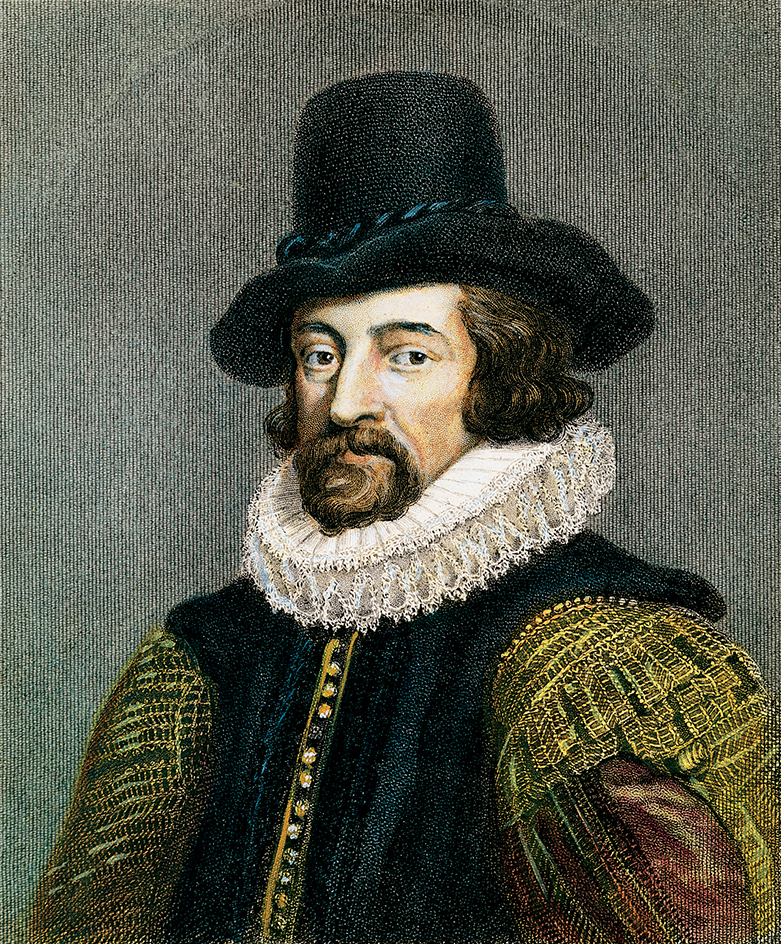Bacon, Francis (1561-1626), was an English philosopher, essayist, jurist, and statesman. He was one of the earliest and most influential supporters of empirical (experimental) science and helped develop the scientific method of solving problems.

Bacon’s principal philosophical writings are The Advancement of Learning (1605) and Novum Organum (New Instrument, 1620). These were the only books that he completed of a planned six-part project called Instauratio Magna (Great Renewal). He intended this work to be a survey of all learning to his time. Bacon wanted Great Renewal to lay a new foundation upon which the whole structure of all knowledge could be soundly built. He also wrote witty and original essays.
His life.
Bacon was born on Jan. 22, 1561, in London, the son of an important councilor to Queen Elizabeth I. In 1584, he was elected to Parliament. Bacon held several government positions, notably lord chancellor. In 1621, Bacon was convicted of taking bribes and imprisoned briefly. Later evidence indicated he was not influenced by bribery. But he withdrew from public life and devoted the last five years of his life to study and writing.
His philosophy.
Bacon believed all previous claims to knowledge, particularly of medieval science, were doubtful because they were based on poor logic. He believed the mind makes hasty generalizations, which prevent the attainment of knowledge. But he also believed that the mind could discover truths that would enable humanity to conquer disease, poverty, and war by gaining power over nature. To discover truths, the human mind must rid itself of four prejudices. Bacon called these prejudices Idols of the Mind.
The first Idol (of the Tribe) is the tendency of general human perception to generalize too quickly. Bacon claimed that uncritical perception cannot be trusted. The second Idol (of the Cave) is the tendency of people to base a knowledge of things on individual experiences, education, and tastes. People fail to realize how variable and untrustworthy these factors can be as a basis for claims to knowledge. The third Idol (of the Market Place) results from the dependence on language to communicate. Because words are often imprecise, they may be misinterpreted. The fourth Idol (of the Theater) is the influence of previous philosophies and laws of reasoning that are merely products of imagination.
Bacon believed the mind could attain truth if it followed the inductive method of investigation. He developed four steps of doing so: (1) listing all known cases in which a phenomenon occurs; (2) listing similar cases where the phenomenon does not occur; (3) listing the cases in which the phenomenon occurs in differing degrees; and (4) examination of the three lists. These steps would lead to the cause of a phenomenon.
Bacon suggested the use of preliminary hypotheses (assumptions) to aid scientific investigation. His treatment of hypothesis is still a subject of study. Bacon also wrote an unfinished romance called New Atlantis (published in 1627, after his death on April 9, 1626). The book describes an imaginary island where the inhabitants dedicate themselves to the study of science.
See also Empiricism ; Enlightenment (Influence of the Enlightenment) ; Essay (Formal essays) ; Philosophy (Modern philosophy) ; Science (The scientific revolution) .
